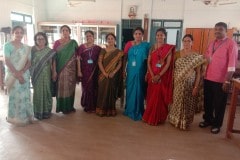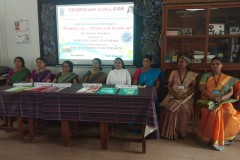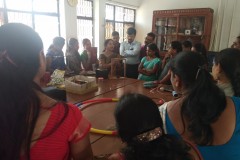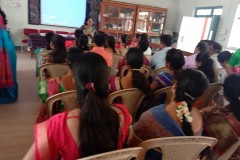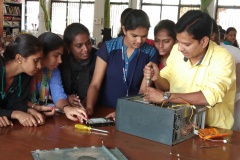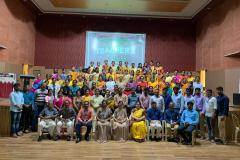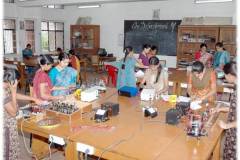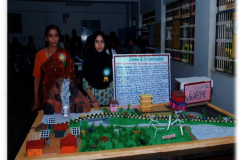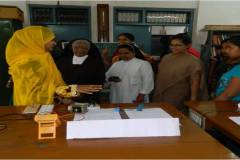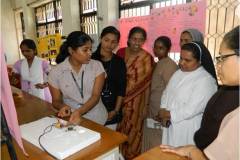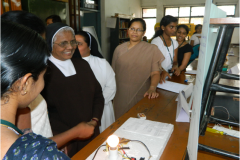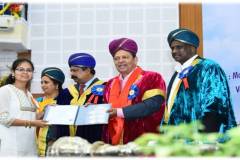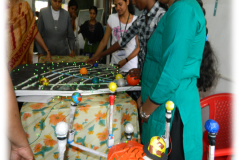Fifty-six years of merit and excellence have rolled in the history of the Department of Physics which was started in the year 1963 with pre-university education. In 1978 B.Sc. - PCM combination was introduced. Mr. S. Vishwanath was responsible for the development of the department at the initial stages serving the department from 1967 till his superannuation in the year 2001. The staff members of the academic and non-academic cadre have always been the stronghold of the department who have played key roles in the outstanding performance in various field of activities. Self-financing combinations PME and PMCs were introduced in 1996.
Core features:
- Experienced and well-qualified faculty and lab technician
- Spacious and well-equipped laboratory
- Certificate courses
- Guest lectures by experts
- Field visits
- Extension activities
- Hands-on training
- Outreach Programme
Courses Offered: BSc (PCM and PMCs)
Certificate Courses Offered:
- Certificate Course on " Renewable Energy Resources and Methods of its Optimal use"
- "Know Your Bank"
- Hands-on Training "Mobile Technology and Computer Hardware"
- Certificate Course on "Cell Phone Technology and UPS Battery Maintenance"
- National Anevshika Experimental Skill Test(NAEST - 2018) & (NAEST - 2019)
- One Day State level workshop on "Enquiry on.... Minds and Hands on" for Science Teachers in collaboration with Indian Association of Physics Teachers(IAPT)
- Energising Present & Future
- Commemorating the Birth Anniversary of Galileo Galilei
Programme outcome
Department of Physics
|
Programme Outcome |
1.Develop, implement the plan of action to acquire new knowledge for specific scientific goals in pursuit of new intellectual interests 2.Students should be able to critically assess current state of knowledge and expertise. |
|
Programme Specific Outcome |
1.Students are expected to acquire core knowledge in physics with special focus on mechanics, quantum mechanics, electromagnetic theory, electronics, optics, special theory of relativity and Modern Physics 2.Learn how to design and conduct experiments demonstrating their understanding of the scientific methods and processes. 3. Realization of the impact of physics and science on society. |
|
Course Outcomes |
|
|
Courses |
Outcomes |
|
Mechanics, Properties of Matter and Sound |
1.To understand the motion of point mass, Conservation laws, gravitation, rotational motion 2.To understand the concepts Properties of matter and sound 3.Students should be able to solve complex and diverse problems in classical mechanics , properties of matter and sound. |
|
Heat and Thermo Dynamics |
1.To understand the basic principle of the Laws of Thermodynamics, Role of Thermodynamic Cycles. 2.Explain the concepts of entropy, enthalpy, reversibility and irreversibility 3.Apply the first and second laws of thermodynamics to various gas processes and cycles, Maxwell’s thermodynamic relations |
|
Optics |
1.To understand the basic concepts of wave optics, physical optics and geometrical physics 2.Learn to conduct the experiments demonstrating the understanding of wave optics. |
|
Atomic Physics and Spectroscopy |
Study of Modern Physics in the fields of : interaction of matter, effect of electric field and magnetic field, to learn the behavior of atoms/molecules in various energy states. |
|
Electronics |
1.To acquire knowledge and apply it to various electronic instruments 2.To motivate the students to apply the principles of electronics in their day-to-day life. 3.To learn the logic gates and to understand the action and application of counters |
|
Electricity and Electromagnetism |
1.To know the concepts of Electricity ,Gauss law, Faraday's Law, Inductance, Alternating Current Circuits, Direct Current Circuits, Network Theorem 2.To understand Electromagnetic theory and problem solving skills |
|
Quantum Mechanics and Relativity |
1.Develop the concepts of modern physics: basic knowledge of special theory of relativity and general theory of relativity, elementary quantum mechanics, nuclear physics, and particle physics 2. Understand the relationship between observation and theory and their use in building the basic concepts of modern physics. 3.Understand how major concepts developed and changed over time. 4. Capable of analyzing and solving problems using oral and written reasoning skills based on the concepts of modern physics. |
|
Solid state physics |
1.Understand basic concepts and mathematical methods of solid state physics. 2.Obtaining the variables derived by problem solving method. 3. Explore important connections between theory, experiment, and current applications. 4.Develop a basis for future learning and work experience |
|
Nuclear Physics |
1.Acquire knowledge in the content areas of nuclear and particle physics, focusing on concepts that are commonly used in this area 2.Develop and communicate analytical skills in subatomic physics. 3. Develop familiarity with the vast areas of nuclear and particle physics as well as develop an interest in these subjects. |
|
Laser and Fiber optics
|
1.To provide adequate knowledge about the basic concepts of Lasers and optical fibres their properties and Industrial applications. 2.Distinguish Step Index, Graded index fibers and compute mode volume. 3.Classify the construction and characteristics of optical fibre/optical cable and its manufacturing techniques. |
|
Condensed Matter Physics
|
1. Explain the significance and value of condensed matter physics, both scientifically and in the wider community. 2.To acquire knowledge about the interplay between classical - and quantum mechanical phenomena, and how microscopic/atomic processes acting between many atoms/molecules produces the typical properties of different solid state matter. |
|
Statistical Mechanics
|
1.Apply the machinery of statistical mechanics to the calculation of macroscopic properties resulting from microscopic models of magnetic and crystalline systems. 2.Apply the Bose-Einstein distribution to the calculation of properties of black body radiation. 3.Apply the Fermi-Dirac distribution to the calculation of thermal properties of electrons in metals. |
|
Analog and Digital Electronics
|
1.To acquire the basic knowledge of digital logic levels and application of knowledge to understand digital electronics circuits. 2.To impart skill on how to design Digital Circuits 3.Analyze different types of digital electronic circuit using various mapping and logical tools and know the techniques to prepare the most simplified circuit using various mapping and mathematical methods. |
|
Radio Communication
|
1.Demonstrate the understanding of functioning of wireless communication system and evolution of different wireless communication systems and standards. 2.Compare different technologies used for wireless communication systems |
‘Work is Worship’ is the unwritten motto of the department handed over from generation to generation. The department of Physics aims to nurture excellence in teaching Physics by promoting extension activities in addition to academics. I look forward to our department, contributing greatly to the field of Physics for society in particular and Nation in general.
Vision:
Offering quality education for science students by creating a conducive atmosphere with an emphasis on academic learning and transforming the students into globally competitive, employable, and responsible citizens.
Mission:
- To stimulate intellectual curiosity, promote scientific temper and instill logical and analytical approach to Problem-solving.
- To motivate students to pursue research in emerging trends.
- To provide necessary support and services for the betterment of students’ progress and welfare and to instill social responsibilities.
Name: Mrs. Sofia Ranjini S
Designation: Assistant Professor
Qualification: M.Sc, KSET
Year of Joining: 2014
Experience: 06 Years
Specialization: Solid State Physics
- Manasa D P honored with 2 Gold Medals and 2 Cash prizes being University topper in Physics during Mysore University Convocation - 2017.
- Tenzin Metok of III B.Sc (PCM) 2018-19 Batch, was selected for internship on merit basis at the premier Institute ‘ INDIAN INSTITUTE OF SCIENCE EDUCATION AND RESEARCH (IISER)’, PUNE.
| Sl. No | Date | Programme Name |
| 1 | 16-02-2018 | Role of Renewable Energy and Energy Conservation in the Present Scenario |
| 2 | 09-03-2018 | One day National Level Workshop on “Sustainable Green Technology for a Brighter Future of the Nation”, |
| 3 | 18-08-2018 | National Anveshika Experimental Skill Test (NAEST) -2018 & Screening test National (Regional level screening test for National test) |
| 4 | 10-08-2019 | ‘National Anveshika Experimental Skill Test (NAEST) -2019’ & Screening test National (Regional level screening test for National test) |
| 5 | 11-12-2019 | Extension Activity: ‘Usage of Renewable Energy Resources in day to day life and its demonstration for schoolchildren’ |
| 6 | 05-02-2020 | One Day State Level Workshop on “Enquiry on…Minds and Hands on”eshika.0 |
| 7 | 02-11-2020 | Energising Present & Future |
| 8 | 15-02-2021 |
Commemorating the Birth Anniversary of Galileo Galilei |
Mrs. Sofia Ranjini
HOD & Associate Professor
Department of Physics,
Teresian College,
Siddarthanagar,
Mysuru - 570011.
Mob : +91 7349376992

